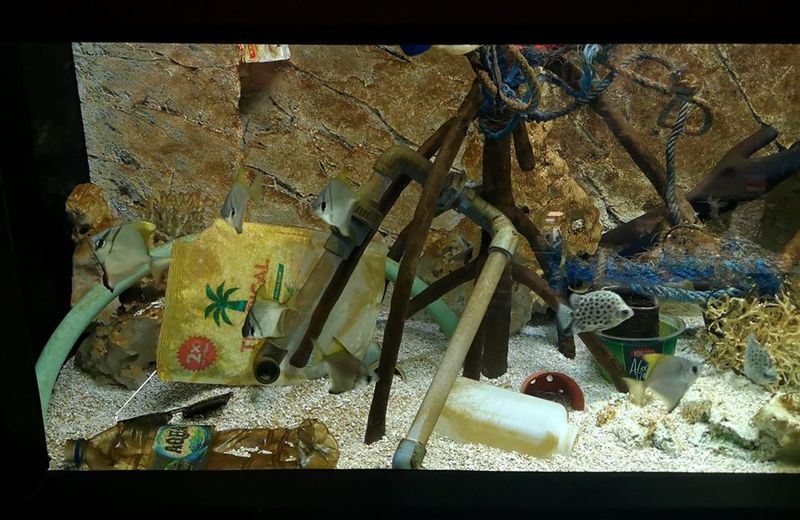Thessaloniki gets ready for its metro launch in November
The underground rapid transit lines have been under construction for almost two decades due to various project delays
 TheMayor.EU logo
TheMayor.EU logo Fish in the Czech zoo coexist with PET bottles, cups and nylon
Zoos are not just meant to be places for entertainment, but also sites where we can learn first-hand about the animal world. As of the end of June, there is one main thing that we can learn from a visit to the zoo of Brno and that is how oceans, as natural habitats, are changing. Unfortunately, not in a good way.
The ways in which human action and in particular the overproduction and improper disposal of plastic pollutes the oceans is the topic of a new installation at Brno zoo. A new aquarium where fish coexists with numerous plastic items is on display, showing the hideous reality of the underwater life that we tend to ignore.
This non-traditional aquarium full of cups, PET bottles, plastic packaging is also home to fish, specifically Scatophagus argus or the spotted scat and Monodactylus argenteus known as silver moonfish. Both species live in Southeast Asia, a place that is severely affected by pollution.
It is a permanent exhibition, part of the pavilion called Exoratium, so every visitor to the zoo can see it.
"People often talk about water and ocean pollution, but they can't really imagine it. It is much more illustrative when they can see it directly and in detail. We show what it looks like for animals when garbage floats around them. And, of course, we hope that this will then raise questions and that visitors will start thinking about it - whether the fish will get involved, eat it, what it means for it, how far the plastic can get into water" explains curator of fish, reptiles and invertebrates breeding Petr Šrámek, quoted on the municipal website.
 The exhibition at the zoo of Brno does not represent a danger to fish, but serves to illustrate how plastic pollution affects underwater life. Photo by Brno Zoo
The exhibition at the zoo of Brno does not represent a danger to fish, but serves to illustrate how plastic pollution affects underwater life. Photo by Brno Zoo
In Brno’s zoo, the curators were careful not to create conditions that put the lives of fish in danger, so there are no narrow fishing nets, hooks or nylon fishing lines. The plastic items, too, are too big to be eaten.
This, unfortunately, is not the case in oceans, where plastic pollution represents a great threat for underwater species and in extension – for humans.

The underground rapid transit lines have been under construction for almost two decades due to various project delays

Now you can get your wine in Talence by paying directly in Bitcoin

That’s because the state has to spend money on updating the railway infrastructure rather than subsidizing the cost of the popular pass

Rethinking renewable energy sources for the urban landscape

The examples, compiled by Beyond Fossil Fuels, can inform and inspire communities and entrepreneurs that still feel trepidation at the prospect of energy transition

Now you can get your wine in Talence by paying directly in Bitcoin

The 10th European Conference on Sustainable Cities and Towns (ESCT) sets the stage for stronger cooperation between the EU, national and local level to fast track Europe's transition to climate neutrality.

At least, that’s the promise made by the mayor of Paris, Anne Hidalgo

The underground rapid transit lines have been under construction for almost two decades due to various project delays

At least, that’s the promise made by the mayor of Paris, Anne Hidalgo

Hostal de Pinós is located in the geographical centre of the autonomous region

Despite its church-y name, the district has long been known as the hangout spot for the artsy crowds

Urban dwellers across the EU are having a say in making their surroundings friendlier to people and the environment.

Forests in the EU can help green the European construction industry and bolster a continent-wide push for architectural improvements.

Apply by 10 November and do your part for the transformation of European public spaces

An interview with the Mayor of a Polish city that seeks to reinvent itself

An interview with the newly elected ICLEI President and Mayor of Malmö

A conversation with the Mayor of Lisbon about the spirit and dimensions of innovation present in the Portuguese capital














